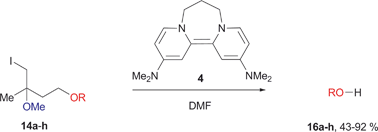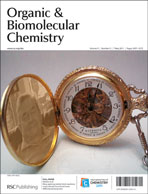Fragmentations observed in the reactions of α-methoxy-γ-alkoxyalkyl iodide substrates with super-electron-donors derived from 4-DMAP and N-methylbenzimidazole†‡§
Abstract
Reactions of super-electron-donors (SEDs) derived from

- This article is part of the themed collection: Free Radical Chemistry special themed issue in memory of Athel Beckwith

 Please wait while we load your content...
Please wait while we load your content...